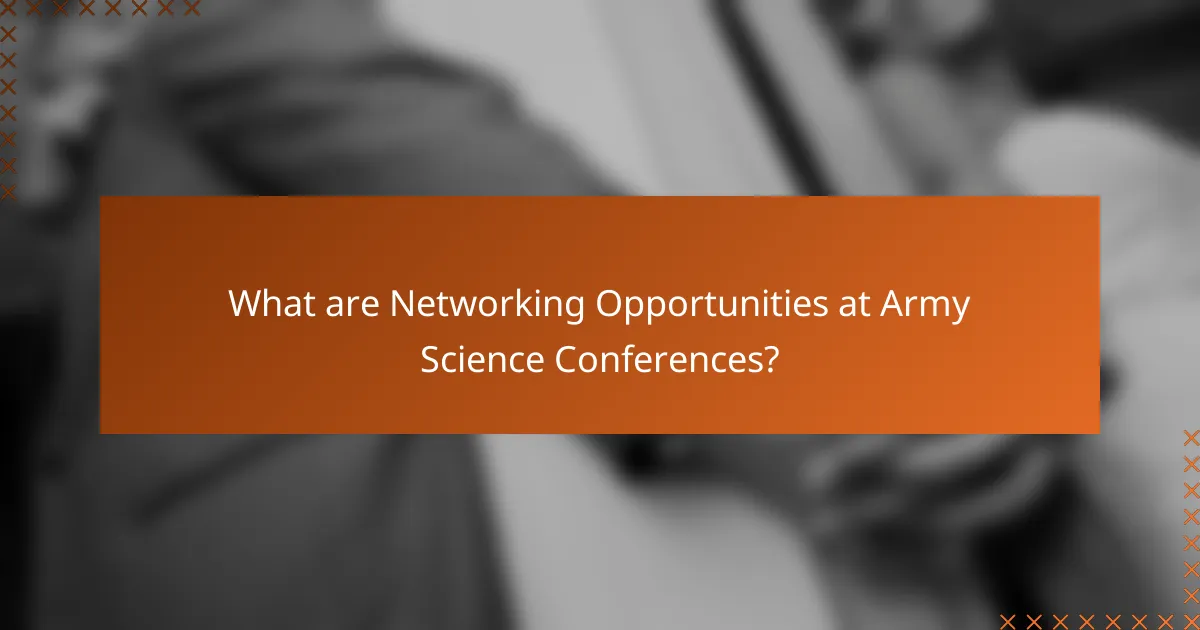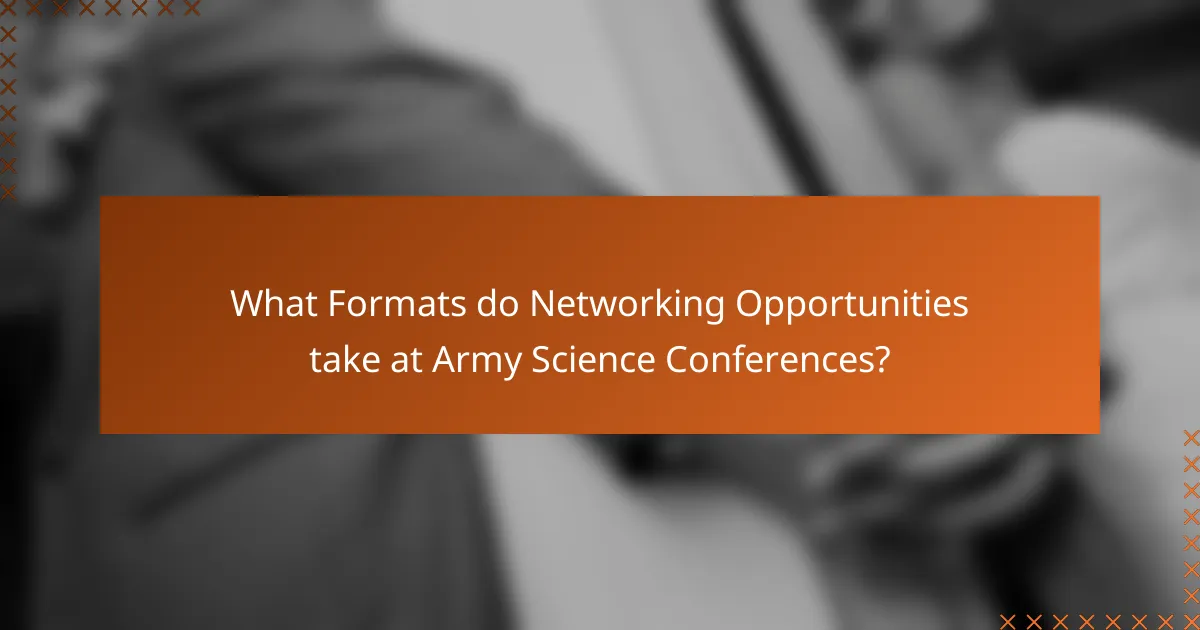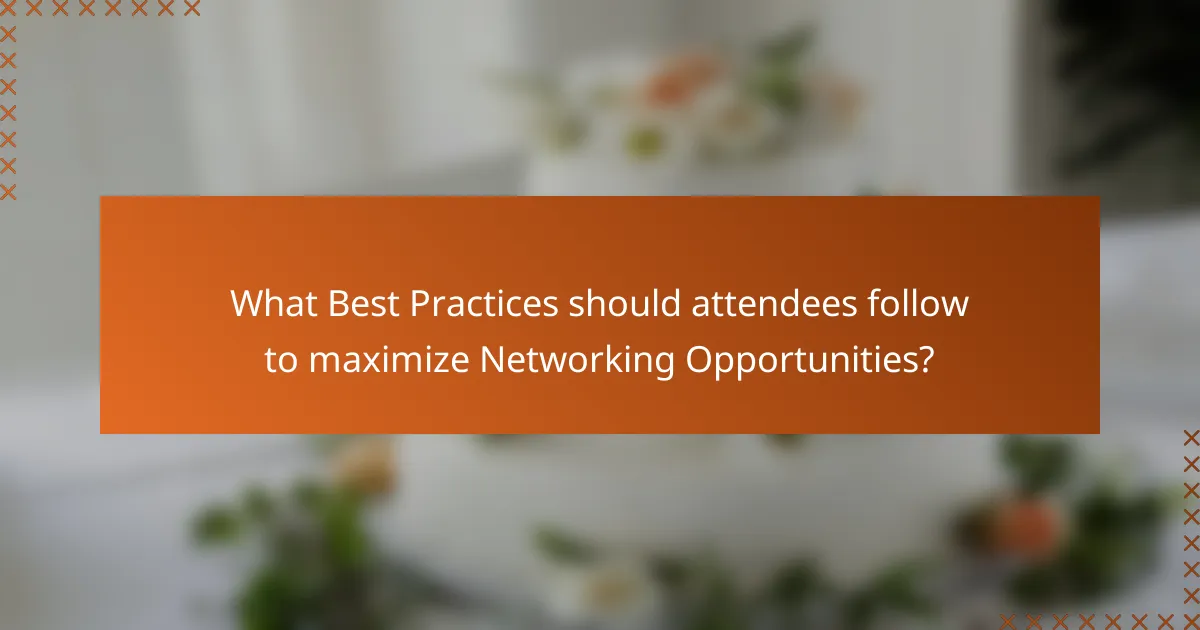Networking opportunities at Army Science Conferences are structured formats designed to facilitate connections among military personnel, researchers, and industry professionals. These opportunities include panel discussions, workshops, and informal meet-and-greet sessions, which promote collaboration and the exchange of ideas on scientific advancements and defense technologies. Attendees are encouraged to engage actively by preparing introductions, researching participants, and utilizing social media for follow-up. The article outlines the benefits of these networking formats and provides best practices to enhance professional relationships within the Army science community.

What are Networking Opportunities at Army Science Conferences?
Networking opportunities at Army Science Conferences include various structured formats for interaction. These opportunities facilitate connections among military personnel, researchers, and industry professionals. Attendees can participate in panel discussions, workshops, and poster sessions. Networking events often allow for informal conversations during breaks and receptions. These settings encourage collaboration and the exchange of ideas. Participants can share insights on scientific advancements and defense technologies. Such interactions can lead to partnerships and future projects. Overall, Army Science Conferences serve as a vital platform for fostering professional relationships in the defense sector.
How do Networking Opportunities enhance collaboration among attendees?
Networking opportunities enhance collaboration among attendees by facilitating connections and fostering relationships. These interactions allow participants to share knowledge and resources. Attendees can discuss common interests and challenges. This exchange of ideas leads to collaborative problem-solving. Research shows that networking increases the likelihood of partnerships. A study by the Harvard Business Review found that 70% of jobs are obtained through networking. Effective networking can lead to innovative solutions and joint projects. Overall, networking opportunities create an environment conducive to collaboration among attendees.
What types of professionals typically attend these conferences?
Professionals attending Army science conferences typically include military personnel, researchers, and industry experts. Military personnel often represent various branches of the armed forces. Researchers from academic institutions and government laboratories contribute their findings. Industry experts provide insights on technological advancements and applications. Additionally, defense contractors and policy makers also participate. This diverse attendance fosters collaboration and knowledge sharing. Such conferences facilitate networking among these professionals, enhancing innovation and strategic partnerships.
How do attendees benefit from connecting with each other?
Attendees benefit from connecting with each other by gaining access to diverse perspectives and expertise. This interaction fosters collaboration and idea exchange. Networking can lead to professional relationships that enhance career opportunities. Attendees often discover potential partnerships for future projects. Engaging with peers can provide insights into industry trends and advancements. According to a study by the American Society for Engineering Education, 85% of professionals attribute their career success to networking. This highlights the importance of connections in professional growth.
Why are Networking Opportunities essential for career development?
Networking opportunities are essential for career development because they facilitate connections that can lead to job opportunities. These connections often provide access to industry insights and mentorship. A study by LinkedIn found that 85% of jobs are filled through networking. Networking also enhances visibility within a field, making individuals more recognizable to potential employers. Furthermore, networking can lead to collaborations that may result in innovative projects. Engaging in professional networks can increase confidence and improve communication skills. Overall, networking is a critical component in advancing one’s career trajectory.
How can networking lead to job opportunities in the military and defense sectors?
Networking can lead to job opportunities in the military and defense sectors by fostering relationships with industry professionals. These connections can provide insider information on job openings that may not be publicly advertised. Networking also allows individuals to showcase their skills and qualifications directly to decision-makers. Attending events like Army Science Conferences facilitates interactions with key figures in the defense community. Engaging in discussions can highlight one’s expertise and interest in specific roles. Additionally, referrals from established contacts can significantly enhance job prospects. Research indicates that up to 70% of jobs are found through networking, emphasizing its importance in these sectors.
What role does mentorship play in networking at these conferences?
Mentorship plays a crucial role in networking at Army science conferences. It facilitates connections between experienced professionals and newcomers. Mentors provide guidance on navigating the conference environment. They help mentees identify key networking opportunities. This relationship can lead to introductions to influential contacts. Mentorship enhances the exchange of knowledge and resources. Studies show that mentorship increases professional growth and collaboration. Networking through mentorship can result in career advancements and partnerships.

What Formats do Networking Opportunities take at Army Science Conferences?
Networking opportunities at Army Science Conferences typically take the form of panel discussions, workshops, and informal meet-and-greet sessions. Panel discussions allow experts to share insights and engage with attendees. Workshops provide hands-on experience and facilitate direct interaction among participants. Informal meet-and-greet sessions foster personal connections in a relaxed environment. These formats encourage collaboration and knowledge exchange among military and civilian professionals. Additionally, networking receptions often accompany conference events, enhancing opportunities for relationship building. Overall, these formats are designed to maximize engagement and facilitate professional growth within the Army science community.
What types of networking events are commonly held?
Common types of networking events include conferences, workshops, seminars, and trade shows. Conferences often feature keynote speakers and breakout sessions for discussions. Workshops provide hands-on learning experiences and opportunities for collaboration. Seminars focus on specific topics and allow for intimate discussions. Trade shows showcase products and services, facilitating business connections. Networking mixers encourage informal interactions among attendees. Career fairs connect job seekers with employers. These events are designed to foster relationships and facilitate knowledge sharing.
How do panel discussions facilitate networking among experts?
Panel discussions facilitate networking among experts by creating a structured environment for interaction. They allow experts to share insights and experiences on specific topics. This setting encourages dialogue and fosters connections among participants. Attendees can engage with panelists through Q&A sessions. Networking is further enhanced during informal discussions that follow the panels. Experts often exchange contact information for future collaboration. Studies show that such interactions can lead to professional partnerships and knowledge sharing. Overall, panel discussions serve as a catalyst for building professional relationships in the field.
What is the significance of informal networking sessions?
Informal networking sessions are significant because they foster genuine relationships among attendees. These sessions create a relaxed environment that encourages open communication. Participants often feel more comfortable sharing ideas and experiences. This leads to the exchange of valuable insights and knowledge. Informal settings can also facilitate collaboration on future projects. Studies show that networking in casual settings can enhance professional connections. For instance, a report by the Harvard Business Review indicates that informal interactions can lead to more productive partnerships. Ultimately, these sessions play a crucial role in building a supportive professional community.
How can structured networking events improve attendee engagement?
Structured networking events improve attendee engagement by providing a clear framework for interaction. This structure facilitates meaningful conversations among participants. Attendees can connect based on shared interests or goals. Organized formats, such as roundtable discussions or speed networking, enhance participation. These settings encourage attendees to engage more actively than in unstructured environments. Research shows that structured networking leads to higher satisfaction rates among participants. A study by the Event Marketing Institute found that 79% of attendees valued networking opportunities in structured formats. This indicates that the organization of events directly influences engagement levels.
What are the benefits of speed networking formats?
Speed networking formats provide rapid connections among participants. This format allows individuals to meet multiple contacts in a short period. Participants can exchange information and build relationships quickly. It enhances networking efficiency compared to traditional formats. Studies show that speed networking increases the likelihood of follow-up meetings. Participants often leave with valuable contacts and insights. This format is particularly beneficial for those with limited time. Overall, speed networking fosters a dynamic and engaging environment for professional interaction.
How do workshops contribute to networking opportunities?
Workshops contribute to networking opportunities by facilitating direct interaction among participants. They create an environment where individuals can share ideas and experiences. Attendees often engage in group discussions and collaborative activities. This promotes relationship-building in a focused setting. Workshops usually attract like-minded professionals with similar interests. This commonality enhances the potential for meaningful connections. Research indicates that 70% of professionals find networking through workshops beneficial for career advancement. Workshops also provide structured time for networking, unlike traditional conferences. This structured approach leads to more productive conversations and connections.

What Best Practices should attendees follow to maximize Networking Opportunities?
Attendees should actively engage in networking opportunities to maximize their benefits. First, they should prepare an elevator pitch to introduce themselves succinctly. This helps in making a memorable first impression. Second, attendees should research other participants beforehand. Knowing their backgrounds can facilitate meaningful conversations. Third, they should attend networking events and sessions. These gatherings are designed specifically for interaction. Fourth, attendees should follow up with new contacts after the event. A simple email can reinforce the connection made. Fifth, they should utilize social media platforms for networking. Engaging on platforms like LinkedIn can extend their reach. Finally, attendees should be open and approachable. A friendly demeanor encourages others to connect. Following these best practices can significantly enhance networking outcomes at conferences.
How can attendees prepare for effective networking?
Attendees can prepare for effective networking by researching participants and speakers in advance. Understanding their backgrounds and expertise helps in initiating conversations. Attendees should also set specific networking goals, such as the number of new contacts to make. Bringing business cards ensures easy exchange of contact information. Practicing an elevator pitch allows attendees to introduce themselves succinctly. Dressing appropriately for the event fosters a professional image. Finally, following up with new contacts post-event solidifies connections. These strategies enhance the overall networking experience and increase the likelihood of meaningful interactions.
What strategies can be employed to initiate conversations?
To initiate conversations, employ open-ended questions. These encourage detailed responses and engagement. Use icebreakers related to the conference topic. This creates a comfortable atmosphere for discussion. Additionally, share personal experiences or insights. This establishes common ground and fosters connection. Observe body language and adapt your approach. This responsiveness can enhance interaction quality. Lastly, follow up on shared interests. This builds rapport and encourages ongoing dialogue.
How important is follow-up after the conference for networking success?
Follow-up after a conference is crucial for networking success. It solidifies connections made during the event. Research indicates that 80% of business professionals believe follow-up is essential for maintaining relationships. Engaging with contacts post-conference enhances visibility and fosters collaboration. Personalized follow-up messages can increase the likelihood of future interactions. Effective follow-up can lead to new opportunities and partnerships. Networking without follow-up diminishes the value of initial connections. In summary, follow-up is a key component of successful networking.
What common mistakes should attendees avoid during networking?
Attendees should avoid several common mistakes during networking. One mistake is not preparing an elevator pitch. A concise introduction helps convey your purpose effectively. Another mistake is failing to follow up after the event. Research shows that consistent follow-up increases connections by 70%. Attendees often focus solely on their needs instead of building relationships. Networking is about mutual benefit. Additionally, attendees may neglect to listen actively. Engaging in conversations requires attentiveness. Lastly, dressing inappropriately can create a negative impression. First impressions matter in professional settings. Avoiding these mistakes can enhance networking success.
How can overzealous networking hinder relationship building?
Overzealous networking can hinder relationship building by creating a perception of insincerity. When individuals excessively promote themselves, they may appear self-serving rather than genuinely interested in others. This behavior can lead to superficial connections rather than meaningful relationships. Research indicates that authentic interactions foster trust and rapport. A study by the Journal of Business and Psychology found that quality interactions are more effective than quantity in building lasting networks. Overemphasis on networking can also overwhelm potential connections, causing them to disengage. Ultimately, effective networking should prioritize genuine engagement over mere quantity.
Why is it important to be genuine in networking interactions?
Being genuine in networking interactions fosters trust and builds lasting relationships. Authenticity encourages open communication and collaboration. When individuals perceive sincerity, they are more likely to engage positively. Research indicates that trust is a critical factor in successful networking. According to a study published in the Journal of Business and Psychology, authentic interactions lead to stronger professional ties. These ties can result in increased opportunities and support within professional communities. Overall, genuine networking enhances collaboration and facilitates career advancement.
What practical tips can enhance networking experiences at Army Science Conferences?
Engaging actively in discussions enhances networking experiences at Army Science Conferences. Attendees should prepare insightful questions related to the conference topics. This preparation fosters meaningful conversations with experts and peers. Additionally, utilizing social media platforms like LinkedIn before and during the event can facilitate connections. Sharing relevant content and tagging participants encourages interaction. Attendees should also attend breakout sessions and workshops. These smaller settings promote more intimate networking opportunities. Following up with new contacts post-conference solidifies connections. Sending personalized messages referencing shared discussions helps maintain relationships. Finally, being approachable and open to conversations increases networking potential.
Networking Opportunities at Army Science Conferences serve as a crucial platform for military personnel, researchers, and industry professionals to connect, share insights, and foster collaborations. The article outlines various networking formats, including panel discussions, workshops, and informal sessions, that enhance attendee engagement and facilitate knowledge exchange. It highlights the benefits of networking for career development, the significance of mentorship, and best practices for maximizing networking outcomes. Additionally, common mistakes to avoid during networking interactions are discussed, emphasizing the importance of genuine engagement for building lasting professional relationships.